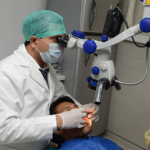All You Need to Know About Dentures
Are you facing trouble chewing food? Do you have loose or missing teeth? Well! If any of these conditions prevail with you, then you must go for a dental check-up immediately.
Here in this blog, we are going to cover the different aspects related to dentures and the various dental procedures related to them. This article will mainly elaborate on the conditions that lead to dentures, do some important #factcheck for you to know the right thing, and share some tips that all good professional dentists recommend for dentures.
Dentures: What Are They?
Dentistry has now become a lot more advanced. You can now easily retain your natural smile with advanced dental procedures. Among the many dental treatments and procedures, dentures are the one among the best ways to retain your natural smile when you have one or more missing teeth.
In simple words, dentures are false teeth that work as replacements for missing teeth caused due to tooth decay, gum disease, or injury amongst the other reasons.
Well! They are much better and advanced as compared to the false teeth used years earlier. Now, there are more options with dentures that you can opt for depending on your preferences and dental requirements. There are conventional or removable dentures, implant-supported or fixed dentures, partial dentures, and complete dentures. You can choose the one that seems viable for your dental condition and cost preferences.
Dentures look nearly identical to your natural teeth and are created to fit snugly with the natural size and shape of the wearer’s jaws and sit across the gums, replacing the missing teeth. It is among the best ways to retain your natural smile without any pain or suffering. Also, maintaining dentures is pretty simple. It’s quite similar to what you do regularly to maintain your natural teeth.
#Tip:
Use a specific toothbrush (dentist suggested type) when you have dentures implanted. Also, daily soak them in a diluted denture-cleaner overnight.
Types of Dentures
Today, there are several types of dentures available. It depends on your need and preference to choose the viable option among them.
Some of the types include:
1. Conventional Full (Complete) Dentures:
This type of denture replaces all of the patient’s teeth. Patients having all their teeth missing due to some or the other reason need to go for this kind of denture. This denture type sits on the top of the gums in contrast to dental bridges which are anchored to existing teeth. Complete (or full) dentures can be typically placed within 8-12 weeks after the original teeth get extracted or removed.
#Tip:
Denture implantation may cause a little bit of irritation sometimes to some patients. If you are the one facing irritation post denture installation, use denture adhesive. This will be provided by your dentist itself or you can also ask for it.
#Factcheck:
Denture adhesive can be used but if the irritation problem persists and you feel the fitting is causing an issue, immediately go to your dentist and get it checked.
2. Partial Dentures:
This kind of denture works when the patient is still left with few natural teeth in good condition. These are quite convenient to have and are good to support the remaining natural teeth from moving or getting damaged. Partial dentures are available as both removable and fixed.
3. Immediate Dentures:
This type of denture is for patients who want to have the teeth immediately placed after extraction.
4. Implant-Supported Dentures:
This is mostly for patients who require added retention because of bone loss. This type of denture provide an anchorage for the teeth to connect to when they are inside the mouth. However, they should be removed for cleaning to retain quality for a longer span of time. The implant-supported dentures offer a solid foundation to hold the fitting securely in place and also look very natural.
5. Snap-in Dentures:
This is quite similar to implant-supported dentures. They are good in terms of stability. They have a solid foundation to hold the dentures securely in place, taking support of dental anchors onto the existing teeth. The locator attachments embedded within the tissue side which snap onto the implants or onto the local receptors make this more of a viable option. This type of denture is used when a patient doesn’t have any teeth but a good enough bone to support an implant.
6. Overdentures:
This denture type sits on the top of the gums and is held in place securely with the implants. It is removable.
7. Upper Dentures:
This is for patients with missing teeth on the upper jaw. Same way, there are dentures for the lower jaw as well, usually referred to as lower dentures
Dentures Cost
| Denture Type | Cost(USA) | Cost (India) |
|---|---|---|
| Conventional Full (Complete) Dentures | $1300-$3000 | INR 30,000 – INR 50,000 |
| Partial Dentures | $650-$2500 | INR 10,000 – INR 15,000 |
| Immediate Dentures | $1500-$3200 | INR 30,000 – INR 40,000 |
| Implant-Supported Dentures | $1500-$4000 | INR 1,80,000 – INR 5,00,000 |
Note: This is a cost comparison data from varied sources on Google. It will depend on the dental clinic and the packages they follow for dentures.
Summary
Dentures are really a good solution for dental conditions like tooth decay, gum disease, tooth loss due to facial injuries, etc. Having dentures help fill out the facial profile and improve your appearance by replacing the gap of the original teeth with synthetic natural-looking false teeth. They are very nicely designed and offer a look exactly like the original teeth. Furthermore, it requires very minimalistic maintenance and caring.
It is definitely a good option to retain your white & bright smile intact.






